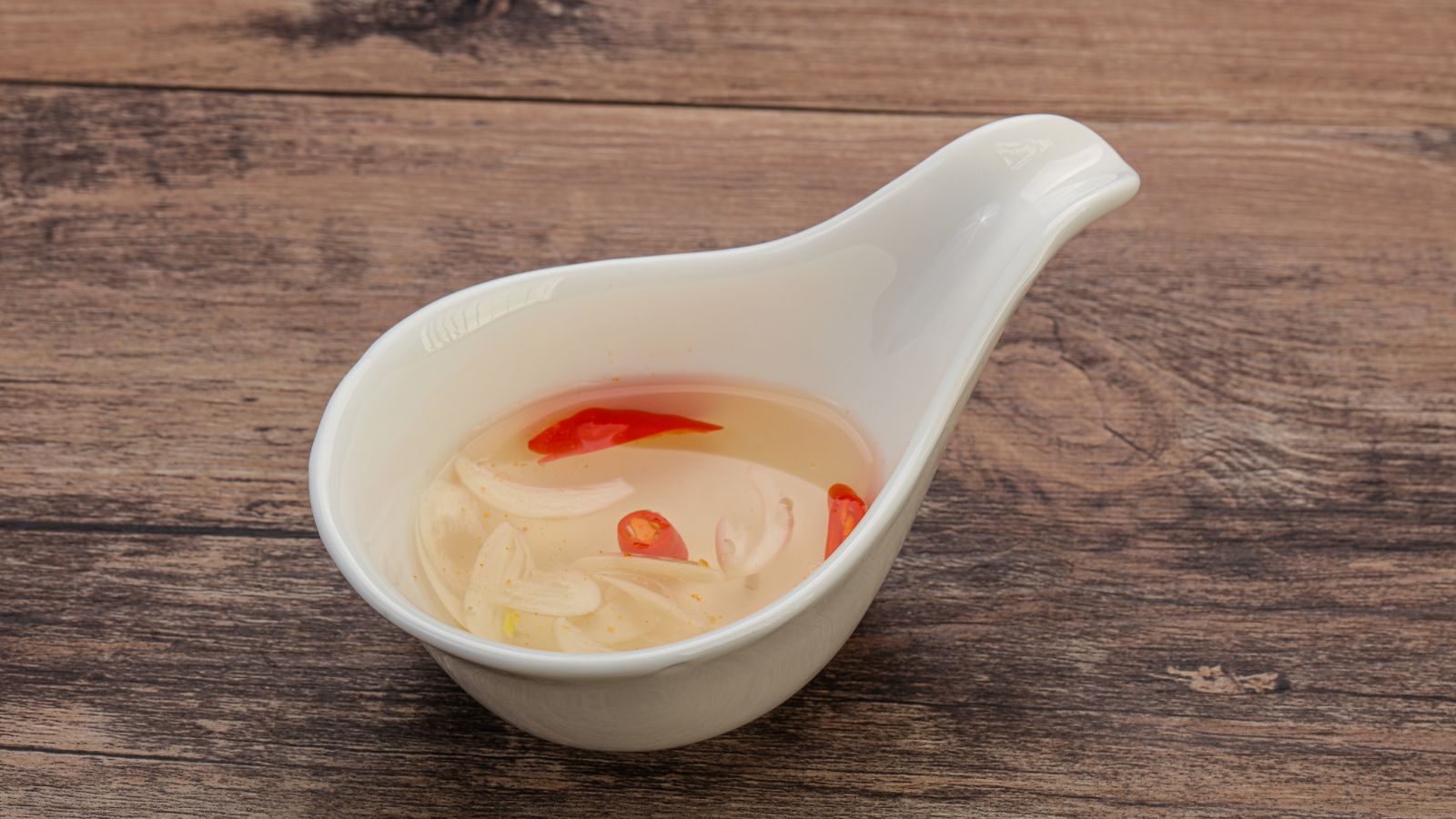
Do You Refrigerate Fish Sauce? Taste, Storage, and Tips
Photo Credit: Canva Pro
Do you refrigerate fish sauce? Fish sauce is a salty, umami-rich sauce that is commonly found in Asian cuisine. However, after you open it, should you keep it in the fridge? This blog gives a clear answer to that question.
You'll find out how to store it, what happens if it's not chilled, and how to tell if it's gone bad. Diet issues are also talked about, as well as safe and fresh ways to keep your fish sauce.
Do You Refrigerate Fish Sauce?
Photo Credit: Canva Pro
Fish sauce is an important part of Thai cooking and many other Asian dishes. It is made by letting fish like anchovies or squid ferment with salt. However, a lot of people want to know: Do you refrigerate fish sauce after opening it? That's the short answer. Yes, especially if you want the best taste and quality over time.
It can stay on the shelf for a while, like soy sauce or Worcestershire sauce, but putting it in the fridge keeps it fresh longer.
Understanding How Fish Sauce Is Made
Putting fish in salt for months or years turns it into fish sauce. This long process naturally preserves the fish and makes a strong liquid that gives sauces, meat, and vegetable dishes umami.
-
Fermentation process: Fill anchovies or other small fish with salt and let them sit for a while.
-
Salt content: The large amount of salt keeps the food fresh and stops bacteria from growing.
-
Byproducts: Salt crystals may form, which is a sign that the fish is really fermenting.
-
Flavor base: It gives food more flavor when used like soy sauce or shrimp paste.
To Refrigerate or Not—The Official & Community Guidance
Some bottles say that refrigeration is not necessary, but many experts recommend it after opening to preserve flavor and aroma. Fish sauce that is kept in the fridge doesn't lose its flavor as quickly and still tastes great.
-
Community habits: A lot of people store it in the pantry, but only for three to six months.
-
Refrigeration benefit: Keeping the sauce in a cool fridge stops it from going bad and keeps it clear and tasty.
-
Manufacturer notes: Some brands, like Red Boat, say to keep them in the fridge to get the best quality.
Does Fish Sauce Go Bad Unrefrigerated?
Photo Credit: Canva Pro
Since fish sauce is salty and acidic, it can last a long time without being refrigerated. It can change in taste and color over time, though, if you don't store it in the fridge. It can still be eaten, but it's not always enjoyable, like oyster sauce or hot sauce.
Why It’s Shelf-Stable (Up to a Point)
Thanks to the salt and fermentation process, bottles that haven't been opened can last for years. However, oxygen and light change the taste and smell once the bottle is open.
-
Natural preservatives: Salt keeps fish sauce from spoiling by inhibiting bacterial growth.
-
Long shelf life: For years if it's not opened; for up to six months if it is opened and not refrigerated.
-
Common with other condiments: For example, soy sauce or hot sauce rarely goes bad, but the flavor does.
When Room Temperature Becomes a Problem
The quality goes down the longer it's left out, even though it doesn't need to be refrigerated to stay safe.
-
Taste loss: It loses its complexity and becomes less tasty.
-
Color change: The sauce might get darker and thicker.
-
Storage advice: Keep fish sauce out of the light and away from heat when not in use.
What Happens If You Don’t Put Sauce in the Fridge?
Photo Credit: Canva Pro
If you don't put fish sauce in the fridge, it can lose its sharp, savory edge. It won't make you sick, but it might make your cooking worse. Refrigeration makes food last longer and taste better, just like mayonnaise and other condiments.
The Science Behind Sauce Storage
Temperature and air exposure can change how long sauces last after they've been opened. Like Worcestershire sauce or oyster sauce, fish sauce can oxidize and get too strong or too flat.
-
Acidity factor: Most condiments last longer when they are cold because bacteria can't grow as quickly.
-
Flavor profile: Without being chilled, the balance of shrimp, garlic, and salty notes fades.
-
Oxidation signs: If the sauce smells or tastes sharp or bitter, it means it's getting old.
Real-World Shelf Life Comparisons
Some sauces age better than others. If you leave out the vinegar-based sauces, fish sauce does worse than mayonnaise.
-
Fish sauce: Three to six months if not refrigerated, or a year or more if kept cool.
-
Soy sauce: With more vinegar and less oil, it lasts longer.
-
Oyster sauce: Needs to be kept cool for quality.
-
Hot sauce: The pantry is usually fine because of the vinegar.
-
Garlic oils or shrimp-based blends: Garlic-infused oils may pose safety risks if not acidified; shrimp-based sauces should be refrigerated after opening for best quality.
How Can You Tell If Fish Sauce Is Bad?
Photo Credit: Canva Pro
Fish sauce naturally stays fresh for a long time, but its quality can get worse over time. It is important to know when something is no longer safe to eat, whether you keep it in the fridge or the pantry.
If you don't store food properly, even brands like Red Boat can go bad. Unlike mustard or ketchup, which use vinegar to enhance preservation and flavor, fish sauce relies on high salt content for microbial safety.
Visual and Sensory Signs to Watch For
Before you use fish sauce in cooking, take a close look at it. If the smell, color, or texture changes, it may be time to throw it away, even if it hasn't gone bad.
-
Color change: An almost-black color could mean oxidation.
-
Strong odor: A sharp, sour smell that isn't like anything else.
-
Presence of mold: floaty bits or cloudiness in the bottle.
-
Strange taste: Don't think it's still fine if it tastes bad.
Taste and Texture Degradation
Bad fish sauce can make your food taste awful. Although fish sauce is made to last, prolonged exposure to heat or light may degrade unopened bottles over time.
-
Texture issues: Liquid that is thick and slimy is not a good sign.
-
Crystals in a jar: Salt crystals are natural and safe.
-
Use clean utensils: To avoid getting bacteria, always use clean spoons.
Is Fish Sauce Safe for Special Diets and Allergies?
Some brands of fish sauce have more than just fish, salt, and water in them. Read the label carefully if you're on a strict diet or are allergic to things like tamarind or dried shrimp. People who don't want added sugar, wheat, or preservatives can choose well-known brands like Red Boat.
Fish Sauce and Allergen Awareness
Some sauces have ingredients that are hard to find. Some may be made in places that also process foods that are common allergens, like peanuts or dairy. Do not think that all brands are safe.
-
Read every label: Check to see if there is tamarind, shrimp, or added flavors.
-
Avoid cross-contamination: Keep the lid on tight and use a clean spoon.
-
Watch for additives: Soy or a form of wheat may be in some sauces.
Clean Fish Sauce Options for AIP and Gluten-Free Diets
If you want to avoid allergens or eat clean, pick a brand that doesn't have a lot of extras. Look for high-quality goods that are kept in a cool place, like the fridge.
-
Good choice: Red Boat only has salt and anchovies in it.
-
Store properly: For best results, keep in the fridge after opening.
-
Perfect for diets: It works well with gluten-free, AIP, and paleo recipes.
-
Use with care: You can put it in Thai food, dips, or even fries for a unique spread.
Final Thoughts
Fish sauce is made by fermenting fish and salt—a process that packs in flavor. Do you refrigerate fish sauce? It's a good idea. After opening, store fish sauce in the fridge to preserve its delicate taste and reduce odor.
While bacterial growth is unlikely due to salt content, refrigeration helps retain the sauce's taste and aroma over time. You can also keep it in the pantry, like ketchup or mustard. To keep it fresh, use a clean spoon, seal it tightly, and store it away from heat. For the best flavor, choose fish sauce without added preservatives and store it smartly.
FAQs
Do you refrigerate fish sauce after fermenting fish in a jar with salt?
Yes, once the bottle is opened, store it in the fridge to keep the taste and reduce smells.
Can unopened fish sauce with preservatives be kept in the pantry like mayonnaise and ketchup?
Yes, but after opening, the fridge is a good choice for quality.
Why does fish sauce smell weird even if refrigerated and unopened with mustard next to it?
Sometimes smells pass between condiments. It’s normal for fish sauce to have a strong odor due to shrimp.
What if the bottle has a bit of salt on top but the story says it’s safe?
Salt crystals are harmless. Just store the jar in the refrigerator and use a spoon.
Is fish sauce safe to store in the pantry near condiments like mayonnaise and mustard?
It’s safe unopened. But after opening, keep it refrigerated for the best taste.

Leave a comment